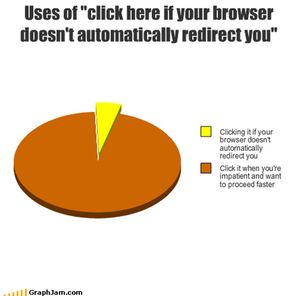Redirect
Redirect is a type of text, website, webpage or anything that contains symbols that does not contain any other symbols except for those sending a person who is reading them somewhere far away with an extremely small chance of return. Everyone who creates or uses a redirect is called a "redirector" or, simply, a "director".
Types of redirects[edit]
Redirects are widely used and can be divided into four main categories:
Web redirects[edit]

Redirects on the World Wide Web are either websites with no particular content except for the different forms of redirects or different webpages with the same feature.
Wikipedia[edit]

Wikipedia is one of the most famous redirect sites (or even redirect pages) in the world. It is mostly famous because of the amount of the redirect sub-pages it currently has. On its main page all the users can see the message of such content: "Welcome to Wikipedia, the free encyclopedia that anyone can edit". [1] After clicking on the word "Wikipedia", the main page suddenly disappears and the link leads him to the article about Wikipedia where the first sentence alone contains at least ten links to other completely different articles.
The majority of readers of Wikipedia (those who spend their whole day following various redirects on this page) state that the links on this website lead you to the original article and so are a dead end. For example, the first link on the Wikipedia article about itself sends the user away to the page called "Wikipedia (disambiguation)". The first link there leads you back. This is the most simple example but it is true for all the links on this site (but sometimes it works like that only after a long series of clicking).
Wikipedia was almost deleted thanks to the initiative of the UN because it took too much place on the Internet and therefore wasted a lot of the world's energy. However, its anonymous creator stated that redirects are pages "that send a person who is reading them somewhere far away with an extremely small chance of return" (certainly quoting this article). Thus, as the majority of people do return (see the previous paragraph) to the pages they came from, Wikipedia has been falsely stopped being considered a redirect.
The situation is still unstable as many people care about the future of the planet and, knowing that they cannot erase the whole project, simply try to blank several sub-pages on Wikipedia. Those pages are always restored after and these people begin being referred to as vandals.
Speech redirects[edit]
Speech redirects (often known as oral redirects) are phrases that do not give any information and are used by people to make their interlocutor leave. These redirects are classified into two main categories:
- SSR (Simple Speech Redirects) or the USSR (how they are often being referred to);
- CSR (Complicated Speech Redirects), often confused with the abbreviation for the Czech Socialist Republic.
The SSR are simple and comprehensible sentences which just inform the person, to whom they are addressed, to leave. For example the phrase "Go to hell" is one of the most commonly used SSRs where the word "hell" is actually the address of a poor place inhibited by different criminals. Others often contain obscenity.
The people who use them a lot are rappers, homeless men and tired interlocutors. On the contrary, the CSR or the ISR (Implicit Speech Redirects) are often used by the politicians, scientists and priests. These are often abstruse sentences containing imperative and to know that they are such, it is sometimes necessary to the listener to follow all the given orders and see if he has changed location or not (whether he has been redirected somewhere else).
One of the examples of the CSR is the famous quote of Winston Churchill: "We shall go on to the end. We shall fight in France, we shall fight on the seas and oceans, we shall fight with growing confidence and growing strength in the air, we shall defend our island, whatever the cost may be [...]". This is one of the most complicated speech redirects ever used. Those who discovered that it was such, were soldiers of the British army. After listening to Churchill's speech and being very bright from their birth, they understood that he actually asks everyone to fight for their homeland (the homeland of most of the British people is a small island between the Atlantic and the Arctic Oceans). They followed his order and suddenly found themselves in a completely different place from where they have been before.
Speech redirects are often used for the purposes of people who say them. Double, triple, quadruple and n-ple speech redirects (when the same redirects are repeated n amount times) are used for the benefit of their biological parents (not the adopters).
Paper redirects[edit]
Paper redirects are very often the printed-out versions of Web redirects. Scientific reviews that just repeat what different scientific investigations report and often (but not always) redirect the reader to all of them are another case. Finally, the address on the paper is also a kind of paper redirect as it does not contain anything except for the location of the place someone wants you to visit.
Other redirects, if been printed out but not on paper, are called real-life redirects. Books are very rarely considered redirects as they often contain some information. But a lot of complicated mystery novels redirect the reader to the previous pages where the reader may find the clue to the murder that he missed. [2]
Real-life redirects[edit]
The redirects in real life are maps, signposts and different clothes with the text printed on them (such as "Go Away", for example). They are often not very successful as it requires more than simple clicking to redirect their target audience to the place they want. Also, the principal differences between the real-life redirects and the virtual redirects (not the obvious one) is that a lot of people on the Internet, who get into the trap of the redirectors, are not willing to be relocated. Opposite to this, people who are redirected by, for example, signposts actually do want to move somewhere else and do not know where they currently are. [3]

